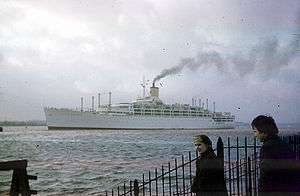SS Orcades (1947)
 Orcades leaving Southampton, Christmas Eve 1967 | |
| History | |
|---|---|
| Name: |
|
| Owner: |
|
| Port of registry: |
|
| Route: | UK – Australia via Suez, later transpacific and via Panama Canal to UK (also cruises) |
| Builder: | Vickers Armstrongs(Shipbuilders) Ltd, Barrow-in-Furness, England |
| Cost: | £3,418,000 |
| Yard number: | 950 |
| Launched: | 14 Oct 1947 |
| Completed: | 14 Nov 1948 |
| Maiden voyage: | 14 Dec 1948 |
| Out of service: | 13 Oct 1972 |
| Fate: | Broken up 1973, Kaohsiung, Taiwan |
| General characteristics | |
| Tonnage: | As built: 28,164 GRT; 1959: 28,396 GRT; 1964: 28,399 GRT |
| Length: | 709ft (216.1 m) |
| Beam: | 90.6ft (25.0 m) |
| Draught: | 31ft (9.4 m) |
| Installed power: | 34,000shp |
| Propulsion: | Geared turbines, twin screws |
| Speed: | 22 knots (41 km/h) service speed |
| Capacity: | As built, 773 1st class, 772 tourist class (1959, 631 1st class, 734 tourist class. 1964, 1,635 tourist class) |
| Notes: | Originally corn coloured hull; white from 1964 refit |
SS Orcades was an ocean liner serving primarily the UK – Australia – New Zealand route. She started service as a British Royal Mail Ship (RMS) carrying first and tourist class passengers. Orcades carried many migrants to Australia and New Zealand [1] and was later used as a cruise ship. "Orcades" is the Latin name[2] for the Orkney Islands.
Built at the Barrow-in-Furness yard of Vickers-Armstrong, Orcades (yard no. 950) had an identical hull and machinery to P&O's Himalaya (yard no. 951), but differed in superstructure and interior layout. The vessel's near-sister ships were Oronsay and Orsova
In 1952 Orcades was fitted with a 'top hat' funnel extension to clear smoke from the after decks. On 7 May 1952, she ran aground in Port Philip Bay, Victoria, Australia.[3] She was refloated and returned to service.
During the 1956 Summer Olympics in Melbourne, Australia, Orcades served as an accommodation ship.[4]
Orcades was refitted in 1959 and 1964. In the 1964 refit, Orcades became a single-class vessel and her hull colour changed from "Orient corn" to white.
Gallery
 Orcades c.1950 from a promotional postcard
Orcades c.1950 from a promotional postcard_taken_in_1959_in_yellow_livery.jpg) Orcades 1959 in yellow livery
Orcades 1959 in yellow livery-_Port_Said_1957.png) Orcades at Port Said 1957
Orcades at Port Said 1957
Footnotes
- ↑ Museum Victoria
- ↑ Encyclopædia Britannica
- ↑ "The Orcades Aground". The Times (52305). London. 7 May 1952. col C, p. 6.
- ↑ Museum Victoria
References
- Latimer, David W (2002) Passenger ships of the 20th century: an illustrated encyclopedia, p. 259, Colourpoint Books ISBN 1-898392-70-6
- Museum Victoria
- Ocean liner museum
- Photographs and deck plans
- ssMaritime